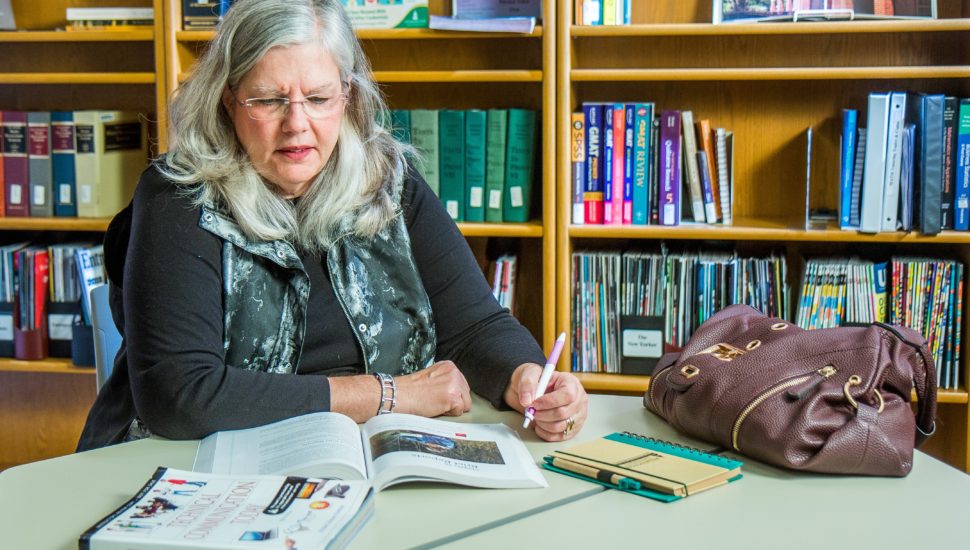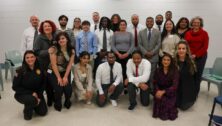With Technical Writers in High Demand, WilmU Prepares Students for a Career in the Field

 By Janice Colvin
By Janice Colvin
Somewhere, sometime, you will write a report or a business plan, or draft a memo, or construct a written procedure that others will follow to do their own jobs or learn a process.
Whether you knew it or not, you were working as a technical communicator.
Technical writing documents the nuts and bolts of daily life in our information-rich society – and we can’t live without it, because it is what helps those who build and fix and serve others do what they need to do by using a manual, a list of directions, or even street signs, to do it.
This is the thought that drives Karen Birk’s desire to continue to teach what she knows. She’s spent countless years honing her craft as a technical writer and communicator, and now is working to give that knowledge to others through specific courses in the Bachelor of Science Communication program in the College of Arts & Sciences at Wilmington University.
You’ll typically see her teaching Technical Writing (COM 250), but she’s also the designer of a new course, Advanced Technical Communication (COM 355), which offers advanced training in the topic as well as specific training for an exam that leads to a professional certification called Certified Professional Technical Communicator (CPTC).
The course teaches a student the nine core skill levels of a technical communicator, and then the student can take the timed examination for the certification if they wish. The CPTC, sponsored by The Society for Technical Communication, is now offered at WilmU for the first time this academic year.
The course and exam are open to current university students and to those already working in the field who wish to add certification to their credentials.
Birk says she designed COM 355 to closely mimic a real working environment, typical of a company that may have a technical communicator as part of an engineering or design group, for example.
“This course is unique in that it is set up to work in teams,” she said. “You would be required to meet with your team, just like the workplace. And the team would report to the boss. The student will experience what that is like, and they will be accountable to the boss for the portion of the project they are assigned.”
The technical communicator would need to wear many hats, and the course prepares students to fulfill that need, Birk said.
“There is a lot of peer pressure in these teams and many things you need to do: research, project management, negotiation, as well as editing your work and that of others,” she said. Paying attention to the ethics of what you write is also important. She said students don’t typically think about that. “You need to be careful with data; the facts are the facts. You are a messenger and are just there to communicate the information, not to doctor it.”
In addition to these aspects, she said, “you must all the while be thinking of your audience.”
The audience is the key to any project, she says – audiences ranging from a highly skilled group with specific technical knowledge, for example, or a general audience, which she said is the most difficult. It takes a lot of expertise to be able to take highly technical data and turn that into something a non-specialist would understand. “The audience matters. That is the first function I ask before I start anything,” she adds.
Birk has been a writing Jill-of-All-Trades during her more than 30 years in the field. “My whole career from a new college graduate to my current position, all the jobs I’ve had have touched on technical writing,” she said.
She says she carried three internships in college and developed a strong portfolio. “I wasn’t paid for any of them, but I had samples. I tell my students to put their work into a portfolio, show employers you can do this.”
Her background includes her first job out of college – working for the president of Miller Brewing Company. At that time, there weren’t many jobs open for graduates with a general writing background, but after Miller hired her that changed.
“Miller gave me a good foundation for being a writer and communicator. I wrote my own television program, I did speechwriting, report writing, and it opened my eyes to what is available to communicators,” Birks said.
As a new graduate, one of the company president’s first tasks for her was to write all his speeches.
“When I heard the applause and saw people coming up to him saying what a great speech, I knew I did a good job.” And he always gave her credit for that success, she notes. Those speeches were “very data-driven, almost like script writing,” she said.
Other positions included working as a communication company president; a general manager and senior writer; owner of her writing services business; and a writer, producer and director for various multimedia projects.
According to the Bureau of Labor Statistics, employment of technical writers is projected to grow 11 percent from 2016 to 2026, faster than the average for all occupations. So multiple jobs are available for students interested in this field, she notes, and she mentioned pulling a survey from popular job listing boards showing good living wage salaries for technical communicators. “There are lots of good opportunities for students. Beginning technical writers can make $50,000 to $60,000 a year, right out of college,” she adds. “With experience, you could make more,” into the $70,000 to $80,000 range or higher.
As an example of the potential, she notes she’s piqued the interest of some of her current COM 250 students enrolled in WilmU’s Information Technology program.
“I’ll mention this in class, and even for them, the light bulb goes off on why they need technical writing,” Birk said. “I tell my students all the time you will find jobs if you think outside the box, and I tell them, too, why not offer more in your tool kit and add certification to your background.”
The new course, COM 355, will help with that, she says.
Birk notes she wants her students to know that technical communication is a viable career path for anyone, not just for writers, but also for those in fields as diverse as health care, business, and technology, because, at some point, no matter what field a student ends up in, a report will have to be written, or a memo will have to be sent. Good writing is a must.
She says she has always considered herself a writer first, and she certainly has found a place as a technical communicator.
“After 30 some years in the field, I wouldn’t do anything differently,” she said. “I encourage all to consider it as a career path. It’s creative and at times challenging but at the end of the day it’s rewarding.”
Click here to learn more about Wilmington University.
[uam_ad id=”80503″]
.
[uam_ad id=”80502″]
Connect With Your Community
Subscribe to stay informed!
"*" indicates required fields






![95000-1023_ACJ_BannerAd[1]](https://vista.today/wp-content/uploads/2023/03/95000-1023_ACJ_BannerAd1.jpg)












































